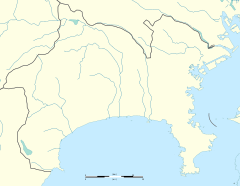Kawasaki Station
This article needs additional citations for verification. (March 2015) |
KWSJT04JK16JN01 Kawasaki Station 川崎駅 | |||||||||||||||||||||||||||||||||||
|---|---|---|---|---|---|---|---|---|---|---|---|---|---|---|---|---|---|---|---|---|---|---|---|---|---|---|---|---|---|---|---|---|---|---|---|
 The east side of the station in October 2011 | |||||||||||||||||||||||||||||||||||
| General information | |||||||||||||||||||||||||||||||||||
| Location | Ekimae-Honchō, Kawasaki-ku, Kawasaki-shi, Kanagawa-ken 210-0007 Japan | ||||||||||||||||||||||||||||||||||
| Coordinates | 35°31′53″N 139°41′49″E / 35.53139°N 139.69694°E | ||||||||||||||||||||||||||||||||||
| Operated by | |||||||||||||||||||||||||||||||||||
| Line(s) | |||||||||||||||||||||||||||||||||||
| Distance | 18.2 km from Tokyo | ||||||||||||||||||||||||||||||||||
| Platforms | 3 island platforms | ||||||||||||||||||||||||||||||||||
| Tracks | 6 | ||||||||||||||||||||||||||||||||||
| Connections |
| ||||||||||||||||||||||||||||||||||
| Other information | |||||||||||||||||||||||||||||||||||
| Status | Staffed (Midori no Madoguchi) | ||||||||||||||||||||||||||||||||||
| Website | Official website | ||||||||||||||||||||||||||||||||||
| History | |||||||||||||||||||||||||||||||||||
| Opened | 10 July 1872 | ||||||||||||||||||||||||||||||||||
| Passengers | |||||||||||||||||||||||||||||||||||
| FY2019 | 215,234 daily | ||||||||||||||||||||||||||||||||||
| Services | |||||||||||||||||||||||||||||||||||
| |||||||||||||||||||||||||||||||||||
| |||||||||||||||||||||||||||||||||||
Kawasaki Station (川崎駅, Kawasaki-eki) is a junction passenger railway station located in the city of Kawasaki, Kanagawa, Japan, operated by East Japan Railway Company (JR East).
Lines
Kawasaki Station is served by the following JR East lines.
The station is 18.2 kilometers from Tokyo and 48.5 kilometers from Ōmiya.
Station layout

The station has three elevated island platforms serving six tracks, with an elevated station building built into a shopping center. The station has a Midori no Madoguchi staffed ticket office.
Platforms
| 1 | JT Tōkaidō Main Line | for Yokohama, Odawara, and Atami |
| 2 | JT Tōkaidō Main Line (Ueno-Tokyo Line) | for Shinagawa, Tokyo, Ueno, Ōmiya JU Utsunomiya Line for Utsunomiya JU Takasaki Line for Takasaki |
| 3 | JK Keihin-Tōhoku Line | for Tsurumi, Yokohama, Isogo, and Ōfuna |
| 4 | JK Keihin-Tōhoku Line | for Kamata, Shinagawa, Tokyo, Ueno, and Ōmiya |
| 5,6 | JN Nambu Line | for Musashi-Kosugi, Noborito, Fuchū-Hommachi, and Tachikawa |
-
Platforms 1 and 2
-
Platforms 3 and 4
-
Platforms 5 and 6
The song "Ue o Muite Arukou" (上を向いて歩こう, Ue wo Muite Arukou), commonly known worldwide as "Sukiyaki" by Kyu Sakamoto is used as the departure melody for Platforms 1 and 2.
History

The station opened on July 10, 1872 (June 5 in original Japanese calendar then in use) as the first intermediate station of the first railway in Japan when it was providing a trial service on the section between Shinagawa Station and Sakuragichō Station in Yokohama before the official inauguration in October 1872.
The Nambu Railway, which later became the Nambu Line, opened on March 9, 1927.[citation needed]
Kawasaki City Tram operated a 6.7-kilometre long (4.2 mi) line from its Shiden Kawasaki terminal in front of this station to the now-closed Shiohama Station from 1944 to 1969.[1][page needed][2][page needed]
Passenger statistics
In fiscal 2019, the station was used by an average of 215,234 passengers daily (boarding passengers only).[3]
The passenger figures (boarding passengers only) for previous years are as shown below.
| Fiscal year | daily average |
|---|---|
| 2005 | 163,495[4] |
| 2010 | 185,300[5] |
| 2015 | 207,725[6] |
Surrounding area

Connected to the west side of the station is the Lazona Kawasaki Plaza shopping mall. Connected to the east of the station is the "Atre Kawasaki" shopping complex. There are also various other commercial establishments around the station, including More-s Department Store, Yodobashi Camera, and Tokyu Hands. Keikyu Kawasaki Station, operated by the private railway operator Keikyu is located to the northeast.
The basement area of the adjoining More's department store is home to what is dubbed "the world's shortest escalator", with a height difference of just 83.4 cm (2 ft 8.8 in).[7]
See also
References
- ^ Imao, Keisuke, ed. (2008). 日本鉄道旅行地図帳 - 全線・全駅・全廃線 [Japan Railway Travel Atlas - All Lines, Stations and Closed Lines] (in Japanese). Shinchosha. ISBN 978-4-10-790022-7.
{{cite book}}: CS1 maint: location missing publisher (link) - ^ Sekita, Katsutaka; Miyata, Michikazu (2003). 川崎市電の25年 [25 Years of Kawasaki City Tram] (in Japanese). Neko Publishing Co., Ltd. ISBN 4-87366-333-4.
- ^ 各駅の乗車人員 (2019年度) [Station passenger figures (Fiscal 2019)] (in Japanese). Japan: East Japan Railway Company. 2020. Retrieved 11 August 2020.
- ^ 神奈川県県勢要覧(平成18年度) [Kanagawa Prefecture official statistics (fiscal 2005)] (PDF) (in Japanese). Japan: Kanagawa Metropolitan Government. Retrieved 26 March 2021.
- ^ 神奈川県県勢要覧(平成23年度) [Kanagawa Prefecture official statistics (fiscal 2010)] (PDF) (in Japanese). Japan: Kanagawa Prefecture. Retrieved 26 March 2021.
- ^ 神奈川県県勢要覧(平成28年度 [Kanagawa Prefecture official statistics (fiscal 2010)] (PDF) (in Japanese). Japan: Kanagawa Prefecture. Retrieved 26 March 2021.
- ^ Wojnowski, Todd (March 2013). "World's Shortest Escalator". Japan Travel. Japan Travel K.K. Retrieved 16 December 2014.
External links
![]() Media related to Kawasaki Station (Kanagawa) at Wikimedia Commons
Media related to Kawasaki Station (Kanagawa) at Wikimedia Commons
- JR East station information (in Japanese)





